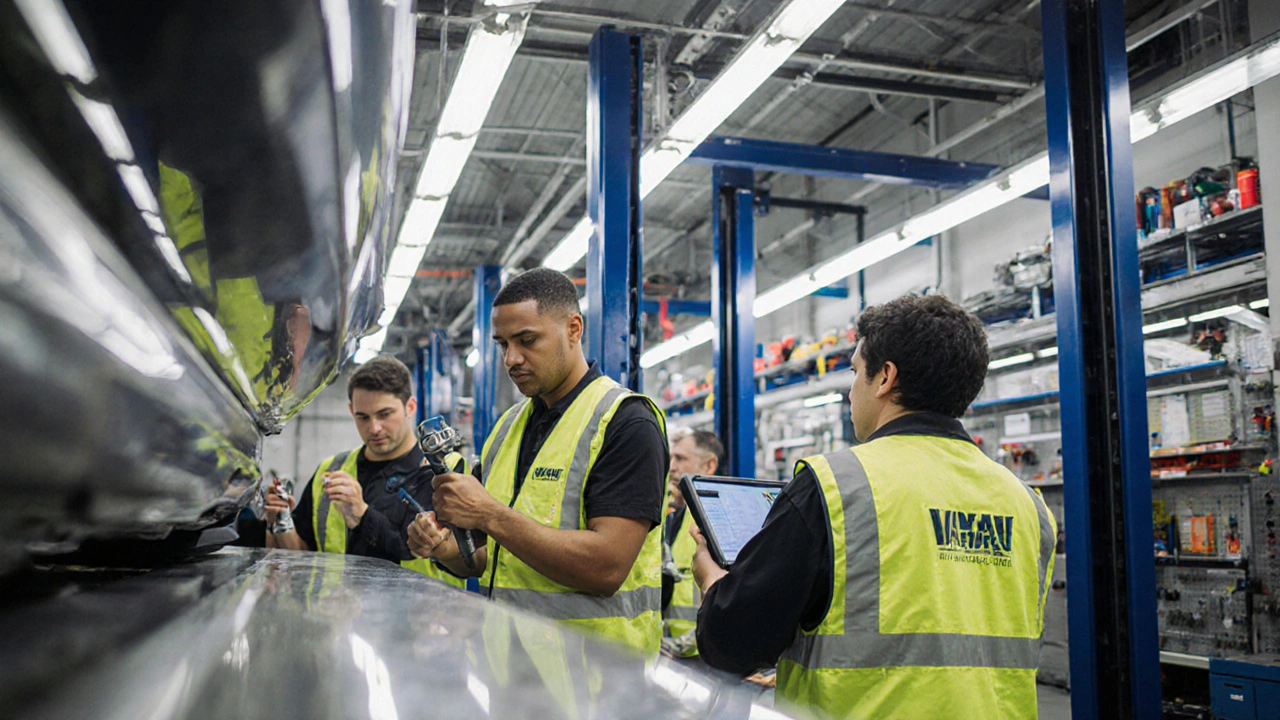Vocational Career Assessment
Find out if vocational careers might be right for you based on the key characteristics of vocational jobs.
A vocational job isn’t just another job. It’s the kind of work where you learn by doing, not by memorizing textbooks. You don’t need a four-year degree to start one-you need tools, practice, and a mentor. Think electricians fixing wiring in old Edinburgh tenements, plumbers unclogging drains in Glasgow flats, or welders building ship parts on the Clyde. These aren’t side gigs. They’re careers that pay well, demand skill, and rarely go out of style.
It’s Built on Doing, Not Just Knowing
What makes a job vocational isn’t the title. It’s the way you learn it. In a classroom, you might study how a car engine works. In a vocational setting, you take apart a broken engine, diagnose the issue, and rebuild it-with your hands. There’s no passing a multiple-choice test to become a certified barber. You have to cut 100 heads under supervision before you’re allowed to work solo.
This isn’t theory. It’s muscle memory. A carpenter doesn’t memorize the angle of a dovetail joint-they feel it. A dental hygienist doesn’t just read about plaque buildup-they scrape it off, day after day, until their hands know exactly how much pressure to use. That’s the core of vocational work: skill is earned through repetition, not lectures.
Training Comes Before the Job
Most vocational paths start with a formal apprenticeship or short-term training program. These aren’t like college courses. You’re not paying £9,250 a year. You’re often paid while you learn. In Scotland, the Modern Apprenticeship scheme lets you earn while you train in fields like construction, healthcare support, or IT support. You might spend three days a week on the job and one day in a training center. By the time you finish, you’ve got a nationally recognized qualification and real work experience.
Compare that to a university degree. You graduate with a piece of paper and maybe an internship. A vocational graduate walks out with tools, a portfolio, and a job waiting for them. In 2024, over 60% of people who completed a Modern Apprenticeship in Scotland were hired by their training employer within six months.
It Solves Real Problems, Every Day
Vocational jobs don’t exist in a vacuum. They fix things people rely on. When your boiler breaks in winter, you don’t call a philosopher-you call a heating engineer. When your phone screen cracks, you don’t need a sociologist-you need a mobile repair technician. These roles exist because society runs on physical systems that break down and need fixing.
That’s why vocational jobs are resilient. No algorithm can replace a plumber who knows how to trace a leak behind a wall. No AI can safely rewire a 1950s house without risking fire. These jobs are tied to human needs that won’t disappear: shelter, health, transport, food, safety.

They Come with Clear Progression Paths
Some people think vocational work is a dead end. That’s not true. A kitchen assistant can become a head chef. A junior electrician can earn a master electrician license. A care worker can train to become a registered nurse. The ladder exists-it’s just not marked with academic titles.
Progression in vocational fields is based on certification levels, not degrees. In the UK, you move from Level 2 (intermediate) to Level 3 (advanced), then to Level 4 or 5 (higher apprenticeships). Each step opens doors to higher pay, more responsibility, and leadership roles. A Level 3 plumbing qualification can lead to running your own business. A Level 5 in healthcare can mean managing a care home.
Pay and Demand Are Rising
Here’s the thing: vocational jobs are in short supply. The UK has a shortage of over 150,000 skilled tradespeople. That means wages are going up. In 2025, the average salary for a qualified electrician in Scotland is £42,000. For experienced ones who run their own businesses, it’s closer to £60,000. That’s more than many university graduates earn in their first five years.
And it’s not just trades. Vocational roles in digital tech are booming too. Cybersecurity technicians, cloud support specialists, and data entry analysts with certifications from CompTIA or Cisco are in high demand. You don’t need a computer science degree-you need a certification, a laptop, and the ability to solve problems fast.
It’s Not About the Prestige-It’s About Purpose
People often choose university because they think it’s the "right" path. But prestige doesn’t pay the bills if you’re stuck in a job you hate. Vocational careers give you something more valuable: clarity. You know exactly what you’ll be doing every day. You see the results of your work. The chair you built is in someone’s living room. The pipe you fixed stops a flood. The patient you helped gets better because you showed up.
There’s dignity in that. It’s not flashy. But it’s real. And it’s lasting.

What Vocational Jobs Look Like Today
Don’t picture dusty workshops and overalls only. Today’s vocational jobs are tech-savvy, diverse, and growing. Here are a few real examples:
- Wind turbine technicians-climb towers to maintain renewable energy systems, earning £45,000+ with training in under two years.
- Automotive mechatronics technicians-fix electric and hybrid cars using diagnostic software and hand tools.
- Veterinary care assistants-support vets in clinics, handle animal care, and manage records without needing a vet degree.
- Construction plant operatives-run excavators, cranes, and bulldozers on building sites after a 12-week certification course.
- Childcare practitioners-work in nurseries with Level 2 or 3 qualifications, often paid while training.
These aren’t fallback options. They’re skilled, respected, and in demand.
How to Tell If a Job Is Vocational
Ask yourself these four questions:
- Can you learn it in under two years with hands-on training?
- Do you need to pass a practical test-not just an exam-to get certified?
- Is there a clear pathway from beginner to expert through certifications?
- Does the job solve a physical, tangible problem?
If the answer is yes to all four, it’s vocational.
It’s not about avoiding college. It’s about choosing the right path for your strengths. If you learn by doing, if you like working with your hands or solving real-world problems, then a vocational job isn’t just an option-it’s your best shot at a stable, meaningful career.
Is a vocational job the same as a blue-collar job?
Not exactly. "Blue-collar" refers to manual labor, often in manufacturing or construction. Vocational jobs include those-but also many white-collar roles like medical assistants, IT support technicians, and dental hygienists. The key difference isn’t the color of the shirt-it’s how you learn. If you train through hands-on programs and earn certifications instead of degrees, it’s vocational.
Can you switch from a vocational job to university later?
Yes, and many do. In Scotland, people with Level 3 vocational qualifications can enter university through access courses or advanced entry. Some universities even give credit for work experience. A qualified electrician might go back to study engineering. A care worker might become a social worker. Vocational experience often makes you a stronger, more focused student.
Do vocational jobs offer benefits like health insurance and pensions?
Absolutely. Most formal vocational roles-especially those through apprenticeships or registered employers-come with full benefits: paid holidays, sick leave, pensions, and health insurance. Self-employed tradespeople can set up their own plans. The myth that vocational work means no benefits is outdated. In fact, many skilled trades offer better job security than entry-level office jobs.
Are vocational jobs only for people who didn’t do well in school?
No. Many top performers choose vocational paths because they learn differently. Some people struggle with abstract theory but excel when they can touch, build, or fix things. A student who failed math in school might become a brilliant CNC machinist. A child who hated essays might thrive as a professional chef. Vocational education doesn’t measure intelligence the same way school does. It measures skill, focus, and problem-solving.
How do I find a vocational training program near me?
Start with your local college or the Scottish Government’s My World of Work site. Search for "Modern Apprenticeships" by trade or region. You can also contact local employers directly-plumbing firms, electrical contractors, and care homes often advertise openings for trainees. Don’t wait for a brochure. Call, visit, ask. Many programs fill up fast.
Final Thought: The Real Value Is in the Doing
A vocational job isn’t about avoiding education. It’s about choosing a different kind-one that turns knowledge into action. You don’t need to be the smartest person in the room. You just need to show up, learn, and do the work. And when you do, the world notices. Not because you have a degree on your wall-but because your hands made something that matters.






